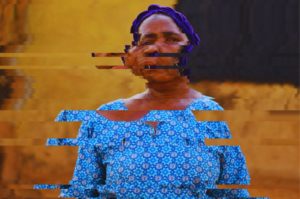
I.
His side of the bed was hot. The other side felt cold. The old man looked through the window. It was night. The aureole of street lamps partitioned the purple of heaven from the grey of shed houses. Darkness obscured the canals. Canaries tweeted in the graveyard. It seemed a time the universe conspired, when the misery of communal life looked calm and beautiful, like the keel and the abyss of a pond. Esther and the old man liked that time of night. It was the time of love and silences. It was the time of frolic and laughter, the time also of deep sighs. The old man thought how nice it must be to stroll the night again. The air at your armpit. The air through the interstices of your stomach. Canaries fluttering in the empty darkness.
II.
The clock struck one-thirty. He could not sleep. Hollowness and heat filled the room wall to wall. He went by the window trying to lure in the cool wind. He did it as a child. He put his face out for a minute through the window and then quickly moved his head back in. That lured the wind. Except this night the air outside wouldn’t let in. He tried again, face out and head in quickly, but without success. On and on it went until he stopped. His back hurt. Sweat had gathered in the lines of his palm, in the cusp of his fingers. He put out his sweaty hands. He dried them in the warm breeze outside. He then set up his chair by the window. Sat motionless.
III.
But tomorrow was Sunday. Which was nice because he would see the boy who waved at him every Sunday. His name was Paul—Paul smiled a lot. The old man concentrated on the boy’s face. For a time that was pleasing. He would forget that too. Tomorrow, he will pass the Waterview bar. Past Chops and Hops. The Ducklington’s. The water factory. The left road of the first intersection at the cusp of the boulevard where the Jehovah Witnesses had eaten supper in February. The road led into the sawmill. The silence of his soul strove to remember. These roads he passed every Sunday. Esther was his bulwark. She taught him. She’s dead. He had forgot her death, her face, her laughter, all the things before. In the place of memory was the sensation of love, a memory-emptiness. That made him anxious. He had a strange impulse Paul could reach Esther. Outline who Esther was. Things they did. He asked Paul every Sunday.
IV.
He read from the book of Isaiah. Then he read King Solomon’s canticles to the Shulamite woman. He began to dose. The room grew compact. Gradually the old man lost all sense of place and time. He could be dead. Maybe he was. Streetlights outlined the old man’s silhouette. His two-inch-high nappy hair ended in whiskers. Brown eyes under the thin outline of a brow. Angular cheeks and a thin wave of dewlaps. A head big for its neck. Last Friday his spasms were strong and persistent. He had sobbed quietly into the pillow. Later he read from the book of Psalms. As a child lies quietly in its mother’s arms, so my heart is quiet within me.
V.
The house was five stories. In the vestibule, a cake of dust trailed the stairs up to the landing. He walked slowly onto the veranda leading to his room. Still, the dust got in. It settled on the utensils and paled the frame which contained the picture of young Adisana Abasi and younger Esther raising ringed hands above their heads. On their wedding day, Adisana Abasi sniffed his suit nine times. He cried after because they had to return that suit. Subsequently he made it a ritual, sitting quietly and staring at the frame. Esther told him, “We had to return it, Adisana.” She kissed him, “But I love you,” and brought his face to hers. “That’s all that matters.”
VI.
Adisana Abasi changed his ritual. He strolled the pavement and the boulevard with Esther every night. His love was tender and like a child he smiled a lot. Onlookers couldn’t do the sums. How Esther ended up with the half-wit! At first, they said, “Esther’s his daughter.” Then, “his niece.” Once Esther was walking at his front, laughing and teaching him an Adebayo-Faleti poem, then she was running back and fell into Adisana Abasi’s hands, and kissed his lips. Everybody saw it. It happened under the street lamp. That bred a communal abhorrence of them. The age difference! The old man’s halfwitedness!
At home, Adisana Abasi told Esther, “People were watching.”
“Let them,” Esther said defiantly. Then almost as if to console him, “I am pregnant.” Smiling, she added, “I’m afraid it’ll be a girl.” Adisana Abasi did not grasp what that meant. He laughed because Esther laughed. He pranced about the room, following Esther’s shadow. Then when Esther stopped beside the sewing machine, he tried to make love to her. It was an immense encouragement to Esther. She was succeeding at teaching Adisana Abasi to want and to want very deeply. This gave way to other things. Esther taught him nouns. Her age was twenty-three. His age was seventy. He had cerebral palsy. He forgot things. Home was a place they were together. She was a tailor. Esther equally taught him synonyms. Simple words he could identify things with. In case he forgot. If Adisana Abasi forgot to carry the sack, he could just carry the pouch. If he forgot the way to the house, he remembered the way home. Language helped him not get lost.
VII.
Adisana Abasi straightened up overnight. A tenacity added colour to his love. In the market, everybody felt this tenacity and the deftness with which Esther appreciated him. The oddity of their home, however, dulled its edges. The sewing machine chugged. It needed oil but the baby was coming. Esther had to save.
“When the baby kicks,” Esther told him, “that’s called contraction.
“Antepartum came before post-partum.”
“The baby’s head is here.”
“September is the date of delivery.”
“We’ll make good parents, won’t we?”
Adisana Abasi paid attention. Esther didn’t. Those were tears in her eyes.
VIII.
It was like time took Esther. Paul was two. He had to eat. Esther worked two jobs. Sales girl by day. She sewed at night. Then something went wrong with Paul. And one day Esther hurried in and was sobbing at Adisana Abasi’s feet, “They are so cruel, they are so cruel, they don’t pity me, they blame me, I hear them, all those people, they think I don’t, but I do.” Their love disappeared under the duress of living. When they least expected it, time took that love. Silence then crept in. Then strife. Then Adisana Abasi slumped one evening in the kitchen. He had felt tired. Later as he slept, Mama Alakara talked with Esther at the door. “On the floor, Mama…” Esther said, “crying like a child… he will not let me touch him… fear… in his eyes.”
“It’ll be fine. Pele, sogbo. Ma sunkun mo. Your husband will kuku be fine.”
IX.
Esther cried so much that day. The old man knew not what to say the day after. He had no language for the distance in Esther’s eyes. He tried to, but so much went on with Esther. They could not talk about the signs. At seven in the evening, Esther drank her ginger in front of the broken pier glass. She studied her body’s change. The hollowness in her collarbones. Skin turning dead white. Gully in her eyes. On the bed she put away her panties and tried to make love to him. Adisana Abasi observed her. Like she was not at home in the house of her body. He wondered at the strangeness of her hands. The wailing in her eyes.
Then one late evening Esther tripped down the stairs and died. When Paul was three and the old man seventy-four, he would blow Paul’s earlobes until Paul squealed and giggled. But after Esther’s burial in April. After the comings and goings of the mourners like the switching on and off of a wristwatch. After the old man strove against the silence of his soul and lost, he began to look at Paul strangely. Like Paul had become as insignificant as the passing of day. So, when Esther’s step-sister took Paul to live at Sawmill Street the old man did not know. He only wondered.
X.
As a child lies quietly in its mother’s arms…
It is with a sense of sacral duty that Adisana Abasi goes to church today. He feels a hole he has to fill. From church, he plans to ask Paul if he remembers. Anything at all. Paul stands at the balcony, never comes down. He walks very slowly on his way from church. He buys two loaves of bread. One for Paul. One for himself. He does not worry much about what to do at home. Home has her longing-for. Home has its own hollowness. The hollowness of frames. He loves that hollowness in its forms because it draws him home.
XI.
Sawmill Street. Children totter on and on, hollering and cursing. The adults play football. The old man keeps to the side where nothing will get to him. He sweats in the palm that holds the loaves, and sees with his periphery the greasy leather orb climb the back of the wind into the silver-lined sky, drop on a stack of uncut logs, roll over the wet sawdust, and stop in his way. From the field across an empty butcher’s shop, a scrawny shirtless boy tells the old man to pass the ball. All the other boys stand and watch. He circles the ball 180 degrees and the boys laugh. Their laughter fades with distance. A horde of little girls sees him and sings.
Pounded yam is food.
Amala is drug.
Not seeing any we eat pap.
To busy the mouth we chew on corn pops.
He sees the fourth house there. Paul’s room faces the road. If I can call his name, the old man thinks, Paul will hear and respond. One loaf of bread for Paul and one for me.
XII.
The curtains of Paul’s room block out the sunlight. The old man sees the design of the curtains from the kerb. Soon his vision blurs. He squints hard. Then he sees the traces of the room fading against the sunlight. Sweat trickles down his belly and behind, down to the split of his bum. Paul will open the curtains, he thinks. He wants to give him this bread. He wants to ask if he remembers. Before he heads home fast. The sun is going down. Daddy, daddy, daddy, he thinks, that is what Paul will call me. One loaf of bread for him and one for me. After waiting a while, Adisana Abasi whistles and calls the name of Paul. When he looks up, the house is turning bright red because the sun is going down. Soon he will forget this too. He will go home.
A man who’s been watching Adisana Abasi in front of the fourth house comes to tell the old man that the whole house has been empty for seventeen days now. “See,” the man points to the front door locked. “They left this morning.”
The old man asks, “Will he come soon? When will they? There used to be a boy there, at the window. This bread… One loaf for Paul… for P-p-pa-p…”
The old man looks up. At the house. The sun going down in the windows. He wonders what it is he’s doing. He cocks his head to the side, trying to remember.
“This bread…” he says uncertainly, “a boy. I saw the boy this morning. Where… where am I, mister, please? The bread… Esther… O… O, what does that mean… My name is Adisana Aba… Adis…”
“Are you fine, Baba?” the young man asks. “Shall I lead you home, baba? Hold my hand, baba? Where do you live, baba?”
Adisana Abasi says suddenly, “Home. I remember. I’m going home. She will drink her ginger at seven. I must hurry home.” Adisana Abasi begins to go away. Very silently. Like a man who, after years of being lost, finally finds himself. Time heals memory.










COMMENTS -
Reader Interactions